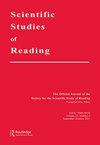Relations Among Motivation, Executive Functions, and Reading Comprehension: Do They Differ for Students With and Without Reading Difficulties?
IF 2.4
2区 教育学
Q1 EDUCATION & EDUCATIONAL RESEARCH
引用次数: 3
Abstract
ABSTRACT Purpose We examined the extent to which achievement goals predict reading comprehension, measured by two response formats (free recall and constructed response), and how these relations differ for students with and without reading difficulties (RD). We further explored how executive functions (working memory and semantic verbal fluency) mediate the relations between achievement goals and reading comprehension. Method We fit multigroup structural equation models with data from monolingual English-speaking fifth graders (n = 146 for RD; n = 109 for non-RD) in the United States. Results Results revealed that achievement goals predict reading comprehension as measured by the free recall but not by the constructed response format, and this pattern was moderated by RD status. For students with RD, mastery goals positively predicted performance on free recall, a relationship that was completely mediated by semantic verbal fluency, whereas performance-approach goals were negatively related to free recall. For students without RD, however, achievement goals did not predict reading comprehension as measured by either assessment format. Conclusion Our findings underscore the need to account for motivational differences in reading comprehension and the importance of fostering mastery goals when teaching reading comprehension, particularly for students with RD.动机、执行功能和阅读理解之间的关系:有阅读困难和没有阅读困难的学生有区别吗?
摘要目的我们研究了成就目标对阅读理解的预测程度,通过两种反应形式(自由回忆和构建反应)来衡量,以及这些关系在有阅读困难和没有阅读困难的学生中的差异。我们进一步探讨了执行功能(工作记忆和语义语言流利性)如何调节成就目标和阅读理解之间的关系。方法采用美国英语单语五年级学生(RD组n=146,非RD组n=109)的数据拟合多组结构方程模型。结果研究结果表明,成就目标对阅读理解的预测是通过自由回忆来衡量的,而不是通过构建的回答格式来衡量的。对于RD学生来说,掌握目标与自由回忆的表现呈正相关,这种关系完全由语义-语言流利性介导,而表现-方法目标与自由回想呈负相关。然而,对于没有RD的学生来说,无论采用哪种评估形式,成就目标都不能预测阅读理解。结论我们的研究结果强调了解释阅读理解动机差异的必要性,以及在教授阅读理解时培养掌握目标的重要性,特别是对患有RD的学生。
本文章由计算机程序翻译,如有差异,请以英文原文为准。
求助全文
约1分钟内获得全文
求助全文
来源期刊

Scientific Studies of Reading
Multiple-
CiteScore
7.20
自引率
2.70%
发文量
26
期刊介绍:
This journal publishes original empirical investigations dealing with all aspects of reading and its related areas, and, occasionally, scholarly reviews of the literature, papers focused on theory development, and discussions of social policy issues. Papers range from very basic studies to those whose main thrust is toward educational practice. The journal also includes work on "all aspects of reading and its related areas," a phrase that is sufficiently general to encompass issues related to word recognition, comprehension, writing, intervention, and assessment involving very young children and/or adults.
 求助内容:
求助内容: 应助结果提醒方式:
应助结果提醒方式:


